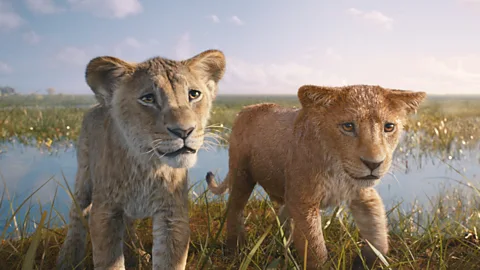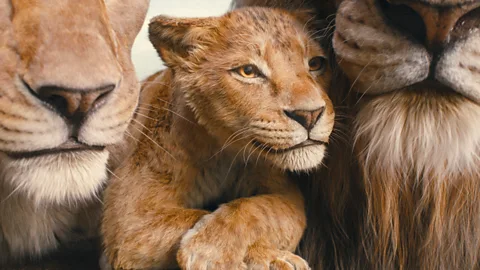Mufasa: The Lion King review: 'Pointless' and a 'contrived cash-in'
 Disney Enterprises, Inc
Disney Enterprises, IncThis prequel to a re-make "never picks up momentum" – "Don't the talented artists involved have anything better to do with their time?"
When the CEO of Disney announced in February that the studio would start relying more on "sequels and franchises", he wasn't joking. Already this year, we've had Inside Out 2 and Moana 2, and now we have Mufasa: The Lion King, a prequel to 2019's photorealistic remake of 1994's much-loved cartoon.
Yes, we're talking about a prequel to a remake. And, yes, it's as pointless as that description makes it sound. This contrived cash-in may be worth sitting through on Disney+ if you're a Lion King superfan, but, like so many prequels, it devotes tremendous amounts of thought and energy to answering questions that nobody was asking in the first place. When did Simba's dad Mufasa meet his wife Sarabi? Where did Rafiki the mandrill get his walking stick? How did Zazu the hornbill become Mufasa's right-hand man (or, I suppose, right-paw bird)? The film is directed by Barry Jenkins, who made the Oscar-winning Moonlight, and the songs are by Lin-Manuel Miranda, the most feted Hollywood and Broadway songwriter of his generation, so a more pressing question might be: don't the supremely talented artists involved have anything better to do with their time?
The big question the film answers, however, is how a lowly lion named Mufasa (Aaron Pierre) found his way to the idyllic Pride Lands with a friend who would become known as Scar (Kelvin Harrison Jr) – and I can guarantee that nobody had been asking that question, because it contradicts everything that was established in The Lion King. If you remember, the whole point of the original film was that Mufasa's son Simba was the latest in a long line of monarchs who had protected the Pride Lands for generations, and that Mufasa's younger brother Scar was annoyed about his place in the pecking order. But presumably somebody at Disney became uncomfortable with that feudal premise, so they've scrapped it in favour of a more complicated and egalitarian origin story. The trouble is that this democratic new version fits the lore so badly that the producers might as well have renamed their film Mufasa: The Lion Prime Minister. It's as bad as Padmé being "elected" as the queen of her planet when she was a 14-year-old girl in Star Wars: Episode I – The Phantom Menace.
Anyway, the film opens with the news that Simba (Donald Glover) and his wife Nala (Beyoncé) are about to have another cub, so they disappear into a forest without telling their daughter Kiara (Blue Ivy Carter) where they're going or why. (The motivation behind this bizarrely bad bit of parenting is never explained.) Kiara's babysitters are Timon the meerkat (Billy Eichner) and Pumbaa the warthog (Seth Rogen), and together they sit in a cave while Rafiki (John Kani) tells her about her grandfather Mufasa. After this unnecessarily long and complicated set-up, the main plot gets underway. (Spoiler ahead)
It turns out that Mufasa doesn't come from a royal bloodline, despite having a name that means "king". As a cub, he lives happily with his family until it's time for one of those childhood traumas that Disney is so fond of: a flood kills his father and washes Mufasa away to a distant region. It's there that he meets the future Scar, who is currently a spoilt princeling named Taka. The two of them grow up together as brothers – but then along comes another childhood trauma. A pack of white lions called the Outsiders invades their territory and kills Taka's father. Mufasa and Taka have to run away, but it's already clear that one of them is becoming noble and brave, while the other is becoming bitter and deceitful.
Mufasa: The Lion King
Director: Barry Jenkins
Cast: Aaron Pierre, Beyoncé, Donald Glover, Blue Ivy Carter, Preston Nyman
Run-time: 1hr 58m
This series of unfortunate events raises more questions than it answers. For one thing, why do so many fathers get killed in the Lion King franchise? For another, why did Rafiki think that this disturbing tale of woe would be suitable for the worried little Kiara to hear? What we're supposed to be asking is whether Mufasa and Taka's trek will take them all the way to the Pride Lands before the Outsiders hunt them down, but, of course, anyone who has seen The Lion King knows that they succeed, so there isn't any tension. Their odyssey includes lots of racing through meadows and scrambling up trees – and the camera does so much whirling and swinging around that you'd be advised to take sea-sickness tablets – but the film never picks up momentum.
At least there is some gorgeous scenery to admire along the way. Because Mufasa and Taka are on the move, the range of colourful vistas is more varied and engaging than the drab brown backgrounds of The Lion King. But the same isn't true of the CGI animals, who are less naturalistic and less characterful than their 2019 counterparts. One issue is that photorealistic lions don't have the most expressive faces, nor do they look especially different from each other. That didn't really matter in the 2019 film, because the lions were usually interacting with other species. But the new film is all about lions talking to other lions while being pursued by yet more lions, so it can be visually monotonous. It can also be challenging to keep track of which lion is which.
 Disney Enterprises, Inc
Disney Enterprises, IncThe animation isn't the only problem with Mufasa: The Lion King, either. The fact is, the quality of every component is a step or two down from its equivalent in The Lion King. Miranda's songs show off his wizardry with scansion and rhyme schemes, but they don't have the karaoke-friendly melodies that Elton John and Tim Rice's songs had. And the voice cast gets worse with every addition to the franchise. Rowan Atkinson voiced Zazu in 1994, John Oliver took over in 2019, and now we have Preston Nyman, who doesn't have the comic chops of either of them. Similarly, Scar was played by the mighty Jeremy Irons in the cartoon, and Chiwetel Ejiofor in the remake, whereas now we have Kelvin Harrison Jr, who can't decide which accent he is going for. As for poor Aaron Pierre in the title role, are we supposed to believe that his voice will ever deepen into the impossibly rich and booming tones of James Earl Jones, the man who played Mufasa in both previous Lion King films? That's as ridiculous as the notion that Jake Lloyd or Hayden Christensen could ever grow up to be Darth Vader.
The worst part of the production is the dull screenplay by Jeff Nathanson, which has Mufasa plodding through Africa, bumping into various members of the supporting cast, and having tedious soul-searching conversations that sound like therapy sessions. There are also regular interruptions, as the film keeps cutting back to Rafiki as he recounts his tale, and Timon and Pumbaa make postmodern wisecracks. These interludes add some welcome comic relief, but they're a reminder that there is hardly any humour in the central narrative. "This story is killing me," moans Pumbaa at one point. "I need a bathroom break!" Viewers will know how he feels.
★★☆☆☆
--
If you liked this story, sign up for The Essential List newsletter – a handpicked selection of features, videos and can't-miss news delivered to your inbox every Friday.
